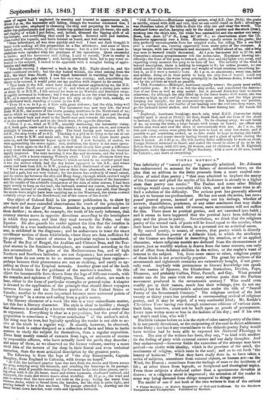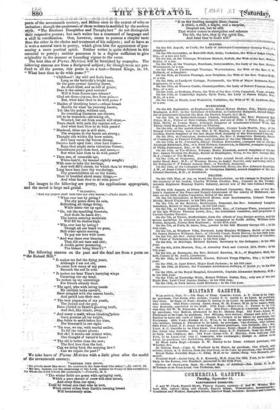EIBTA.S blETRICA. * THE inferiority of " sacred poetry " is
generally admitted. Dr. Johnson has endeavoured to account for the failure of devotional verse, on the plea that an address to the Deity proceeds from a more exalted con- dition of mina than poetry ; "that man admitted to implore the mercy of his Creator and plead the merits of hia Redeemer is already in a higher state than poetry can confer." The Psalms and some other Biblical writings would seem to contradict this view, and at the same time to af- ford a solution of the difficulty. The serious poet has generally allowed his art to become too predominant. He has not sunk the artist, but com- posed general poems, instead of pouring out his feelings, whether of sorrow, thankfulness, penitence, or any other sentiment that may shake or agitate the religious mind. Of course, mere earnestness will not suffice for this. There must be poetical genius, and art 'exercised into habit ; and it seems to have happened that the poetical. have been deficient in piety and the pious in poetry. Nevertheless, we think that the religion poetry of the second rank of poets will be found equal to the secular, when their heart has been in the theme, in a personal not an artistica! sense. By sacred poetry, is meant, of course, that poetry which is directly devotional. Serious poetry of a didactic kind, in which the attributes of the Creator are desoribed in describing his creation, or of an applied character, where religions motile are deduced from the circumstances of nature, just as worldly wisdom is drawn from the tame sources, can only fail of effect from deficiieni abilities in the writer, or the reader's want of interest in the subject. Yet, from some cause or other, religious poetry of these kinds is not practically popular. The great lay authors of the seventeenth and eighteenth centuries are extensively bought, if not gene- rally read. Anybody with pretensions to literary knowledge can speak off the names of Spenser, the Elizabethan dramatists, Dryden, Pope, Thomson, and probably Collins, Prior, Parnell, and Gay. What general reader can do the same with the many serious poets that the Puritan movement produced in the seventeenth century ? Who could even readily get at their names, much less their writings, (we do not say works,) but for Mr. Catternaole's selections under the title of "Sacred Poetry of the Seventeenth Century." The religious revival of the last twenty or thirty years has produced a corresponding revival of religious poetry, and it may be urged, of a very successful kind ; Mr. Keeble's Christian Year having run through numerous editions of various sizes. Such facts, however, must not be built upon as proofs of permanence. Every man writes more or less in the faahion of his day ; and if his own age won't read him' who will ? The little volume before us is in the style of other sacred poetry of the time. It is not purely devotional, or the outpouring of the soul in direct addresses to the Deity; nor has it any resemblance to the didactic poetry Paley would have written bad lie been able to expound his Natural Theology in verse. The aim of the writers has been, they say, "to bind with another tie the feeling of piety with external nature and our daily thoughts. And they endeavoured—however feeble the execution of the attempt may have proved—to clothe with ideality, which is the province of the mind, the sentiments of religion, which rests in the soul; and so to set forth'the beauty of holiness.": Whet they:hive rially done is, to have taken a series of subjects, sometimes from natural objects, or human art—as the Wind, the Beacon ; sometimes from the feelings of man or the incidents of life ; at other times from legends, or Scriptural and theological topics. From these subjects a deduced rather than a spontaneous devotion is drawn ; or a religious moral is impressed; the attention of the reader in some way being directed from things temporal to things eternal.
The model of one if not both of the two writers is that of the serious
• Pietas Metrica ; or Nature Suggestive of God and Godliness. fly the Brothers Theophilus and Theephylent. ruble:bed by blasters. poets of the seventeenth century, and Milton once to the extent of echo or imitation; though the quaintness of those writeratig modified by the modern -style. "The Brothers Theophilus and Theophylact " do not distinguish their respective poems; but each writer has a command of language and a skill in versification. Ong, however, seems to possess a simpler taste than the other in the choice and treatment of his subjects; and to hive as it weft a natural taste in poetry, which gives him the appearance of po.s- sessing a more poetical spirit. Neither writer is quite deficient in this essential to poetry; neither possesses it in a degree Suffioient'to give originality to the manner or bounding vigour to the verse. The best idea of Pietas Illetrieci will be furnished by examples. The following stanzas are from a Scriptural subject ; for though texts are pre- fixed to all the poems, this poem is on a text--Second Kings, ix. 18. "What bast thou to do with pesce ? ",
"Childhood! thy wild and frolic hour, Long as the butterfly's bright race, Or the gum-cystus' dazzling flower, • As short-lived, and as full of grace; Does it the calmer good contain?
Will it from future care release? Glad art thou--joyous, free from pain,— • But what bast thou' to do with peace "Maiden of throbbing heart,—whose breast Hardly for whatAis yearning knows,. Yet like the polyp, withouttest,
Its trembling filaments out-throws, Oft to be wounded,--shrinking oft,
Wearied, but not from search will cease— Tears check with pain thy rapture soft,— And what bast thou to do with peace? "Manhood, thine eye is still elate, i The weapons n thy hands are strong; Thoight Sits within thy brow sedate,
And busy caret thy bosom. throng.
Success bath sped thee; thou hest fame— Bays that might Serve victorious Greece; Tumultuous joys thou bast, and name,— But what hast thou to do with peace?
"Thou sire, of venerable age, White-hair'd; for tounsel rightly sought; With sons hi take thy heritage, And■well-fill'd chests, for which thou 'at wrought:
Long have been here thy wanderings, Thy grandchildren sit on thy knees; Thou 'rt troubled' about many things,—
And what hest thou to do with peace?"
The images in the following are pretty, the applications appropriate, and the moral is large and genial.
"BLESSING.
_.And my prayer shall turn into my own bosom.'—Psalm xxxv. 13.
"What ever lost by giving ?
The sky pours down Its rain,
Refreshing all things living, While mats rise up again.
"Go, rob the sparkling fountain,
• And drain its basin dry; The barren seeming mountain Will fill its chalicehigh. "Who ever lost by loving Though all our heart we pour, Still other spirits moving, To pay our love with more. "And was there ever blessing That did not turn and rest; A double power possessing, The blesser being bless 'd?"
The following stanzas on the past and the dead are from a poem on "the Ruined Mill."
" It makes me feel the flying years,
Although I am not old, To count how many of my peers Beneath the sod fie cold.
"It makes me hear Time's hurrying wings Careering o'er my head, To reckon up my sorrowings For friends already dead. • "The aged, Who "with loving hands My childish locks careas'd,
Have mingled with the unseen bands, And pasakl into their rest.
"The very playmates of my youth, The jocund and the gay,
Have yrelded to Death's gnawing tooth„ And fled, like clouds, away. ' - "And many a maid, whose blushing:prime Gave promise all too bright, ,Has fallen to earth before her time,
• Nor blossom'cl in our sight.
"'Tie true, we try, with tearful smiles, To fill the vacant places; But oh!' it Mocks our utmost wiles, One thought of vanish'd faces "" The old is better than the new; The first love than the last.
Can We bring back the morning flew?
Can we regain the past?"
We take leave.of Pietas Megrim with alittle piece after tlie model of the seventeenth century.
"BEFORE THE SNOW.
' He giveth snow like wool: He scattereth the heir-frost like asleps.',-/14. =Wit. 16.
• I Ity eon, despise not the chastening of the Lord, neither be wearicetits correction; for Whom the Lord loveth He correcteth.'-Proverbs, IL 2. "The winter fields are green with springing. corn, Which a pare Arend of snow will soon mvest,
And cover from our eyes; - Until by vernal airs that robe be torn, • When cereal riches from Earth's teeming breast Will bounteously arise.
"If on thy &Alio 'ener .1eS there chaoC----- g
A check, a chill, a blight, and a surprise, , ; Despond not, but be still.
That winter comes to strengthen and enhance - - The life, the love, that in thy spirit lies, Arid bend thee to God's will."



























 Previous page
Previous page